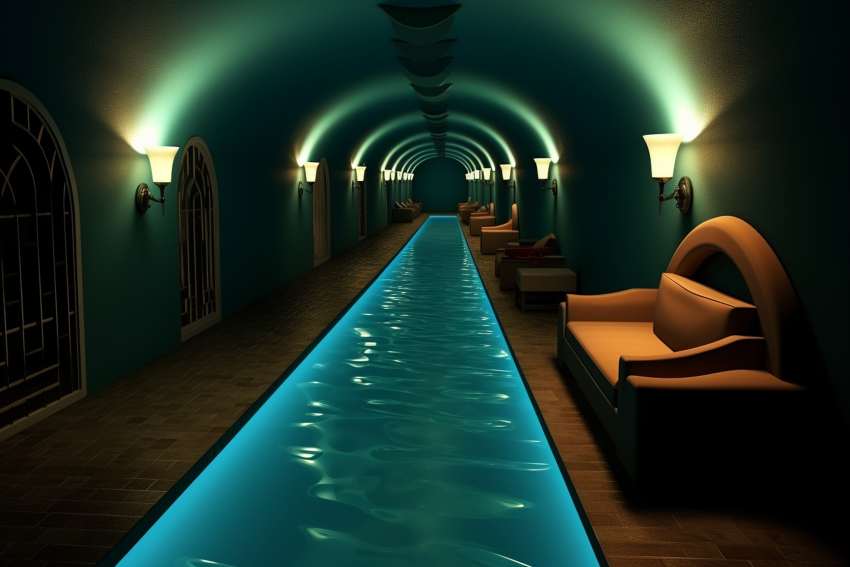
Crete, Alicante, Athens, Madrid, and Limassol Pioneer Underground Hotels and Air-Conditioned Beaches to Redefine European Tourism Amid Soaring Heat : A Cooler Future for Mediterranean Tourism- Here’s Latest Information Only For You

In the bright Mediterranean heart, something amazing is going on. Summer temperatures are soaring in places such as Crete, Alicante, Athens, Madrid and Limassol, and tourism is changing, and changing to the core. Once fueled by a culture of sun-worship and open-air leisure, these cities are leading Europe in the drive toward subterranean hotels and air-conditioned beaches — futuristic ideas that are fast becoming matters of life and death.
With our environment problems getting worse year on year, traditional tourism models are being reviewed. Now, Mediterranean countries, long magnets for summer tourists, are balancing the income from their soaring travel economies with the physical limits of rising temperatures. It is the precarious equilibrium in between in which innovation abounds — and a new era of tourism is being born that values comfort, sustainability and staying alive.
Mediterranean Climate Disaster: Heatwaves Are Wrecking The Tourist Trade
Recent summers have been record-setting. In June of 2025, certain areas of Spain hit 46°C. Several days above the 40°C threshold cropped up in Greece, which caused the Ministry of Culture there to close the Acropolis in Athens. France has also had to restrict access to such landmarks as the Eiffel Tower because of the dangers of overheating.
That sort of heat sends travelers running for cover, but it also brings health risks for locals and the tourism industry workers. The European Environment Agency has documented an explosion of heat-related illnesses in southern Europe, prompting calls for a new protocol for “extreme temperature days” and widespread anger among the public.
Confronted with these grim truths, tourism operators have begun deploying ambitious solutions that can deliver both luxury and resiliency. Among the most hopeful are subterranean living spaces and climate-controlled pleasure domes.
Cool Below Ground: The Subterranean Hotels
Crete, the largest Greek island, is providing a prominent example. The new boutique hotel, which opened in the summer of 2025, boasts suites that are mostly underground and constructed in a way to take advantage of naturally cooler temperatures. These half-buried rooms depend on earth insulation and sun-shaded courtyards to control interior temperature without heavy reliance on air conditioning.
The design is deeply intentional. Rooftop gardens serve as insulation against heat and a system of breezy open-air corridors replace the mechanical cooling that a more enclosed building might require. This architectural style uses ancient mediterranean traditions which–with an updated technology–can provide comfortable environmental conditions year-round.
It is not just about energy savings. Underground resorts can slash the environmental cost even more than traditional ones, defending visitors against deadly heat waves and making an economic virtue of sites previously written off because of extreme weather.
Air-Conditioned Beaches and Coastal Adaptations
The era of air-conditioned downtime has gone beachside, in Cyprus’s Limassol. While the ideal of the beach cabana of yore conjures images of the flapping canopies and handheld fans reminiscent of childhood summers long past, the modern generations offer built-in cooling—complete with misting devices, insulated floors and prints that connote the sense of a breeze wafting on the wind.
Similar adaptations have been popping up across Spain. Holidaymakers in Alicante, on the Costa Brava, can now bask on beaches featuring shaded promenades, high-pressure mist systems and reflective surfaces to reduce heat absorption. These advancements keep people outdoors for longer, even in the scorching heat of the afternoon, without having to worry about dehydration or heatstroke.
Luxury resorts, too, are bankrolling shaded swimming pools and high-efficiency cooling lounges, particularly in zones previously dismissed as “too hot to host.” The approach enables major coastal tourist resorts to continue to function amidst rising thermal stress.
Madrid and Athens: Comfort With Leading Culture
The cities are close on the tail. The indoors are in with a vengeance this summer in Madrid. Cultural relief: Since 2014 the city has also played host to ”Refúgiate en la cultura” (or ”find refuge in culture”), a cultural relief plan allowing those forgoing sunbathing and siestas to take in a free flamenco show in an air-conditioned museum during peak daylight hours. Museums like the Prado have experienced peaks in foot traffic between 3 p.m. and 5 p.m., times that in decades past were the slow hours.
Athens, also has embraced climate-smart scheduling. The hours for tour groups have been adjusted to early morning and late night, and several cooling centers have been set up around the city. Even high footfall archaeological sites now provide shaded areas, water stations and modern ticketing (that doesn’t involve standing in the sun between 12-3pm). The ancient city, a longtime haven for summer tourists, is evolving into a cooler — and more navigable — destination.
Sustainable and Safe: A Tradeoff?
Building subway stations underground and climate-controlled isn’t only about making things more comfortable for tourists — it’s an issue of public safety. The DEATH of a street worker in Barcelona in the July 2025 heatwave has brought new urgency to union demands for better protection of workers in the heat. That means more tourist sites will temporarily close or reduce hours when temperatures pass critical levels.
In cities including Athens, Limassol and Madrid, authorities are already collaborating with public health officials to identify and certify “heat-safe zones” in a bid to keep the combination of health risks and economic hardship at bay. These facilities are museums, malls, covered parks, and some beach establishments that have the proper ventilation and cooling requirements. This move towards a safety certification makes sense in the wider European strategies for climate resilience.
The Economic Opportunity: An Extended Season
Given the precarious state of summer as a traditional tourism season, many destinations are advertising spring and fall. Ibiza, for instance, has successfully pushed its tourism season into October, taking advantage of post-peak warmth and sparser tourists.
Reservations for September and in some cases even early November are climbing rapidly, according to data from tourism boards — especially among older travelers and families who are hoping for more manageable temperatures. These dynamic patterns yield a dual dividend: preserving health and boosting local economies year-round.
In Crete, Alicante and Limassol, hoteliers are now promoting off-season experiences that include wine-tasting, hiking and cultural excursions — pursuits traditionally save for summer but now just as prevalent in cooler months.
Invention Begets a New Tourism Ethic
Beneath these technological and policy shifts lies a deeper one: that of adaptation, inclusion, and foresight. Cities like Madrid and Athens have shown that the future of tourism in the modern world is not only about where people go but how destinations take care of them when they get there.
Air-conditioned beaches, indoor cultural programming and underground stays are not niche options anymore. They are the building blocks of climate-smart travel — a buzzword that is rapidly being adopted everywhere, from national tourism campaigns throughout southern Europe.
Importantly, these innovations are scalable. Smaller towns and lower-tier cities can replicate that model with their own resources. Shaded neighborhood parks, mist-cooled markets and climate-refuge museums are affordable, accessible stopgaps for embracing travelers in a less and less hospitable climate.
In the Future: Antifragile Tourism for a Hotter Tomorrow
The future of Mediterranean travel could well bear little resemblance to the golden postcards of the past. Sunburned shoulders and midday ambles are being replaced by naps in subterranean suites and moonlit dinners under cooled arcades. The charm is the same — but the infrastructure is changing.
As the world heats up, tourism can help cool it off. Quite right: Crete, Alicante, Athens, Madrid and Limassol are not giving up without a fight. It is being protected — by intelligent designs, shared care, and a determination to keep festivities happy, even under a shifting sky.
Here, from below the ground to along the shore side, are a few examples from cities showing that tourism can be enjoyable, responsible and hot as hell.
The post Crete, Alicante, Athens, Madrid, and Limassol Pioneer Underground Hotels and Air-Conditioned Beaches to Redefine European Tourism Amid Soaring Heat : A Cooler Future for Mediterranean Tourism- Here’s Latest Information Only For You appeared first on Travel And Tour World.
Crete, Alicante, Athens, Madrid, and Limassol Pioneer Underground Hotels and Air-Conditioned Beaches to Redefine European Tourism Amid Soaring Heat : A Cooler Future for Mediterranean Tourism- Here’s Latest Information Only For You
| Divisions of Shy Paris Entertainment | ||||
|---|---|---|---|---|
| Shyparis Entertainment | Shy Paris Bookings | Linkz Radio | Klublinks | Shy Paris |
Shy Paris Bookings is a Division of
❤Shy Paris Entertainment ||||| International Spectacular Events, Stellar Event Planning and Management, & Celebrity Booking Agency. Please contact us as we can provide you with both international and/or local renowned full service event planning and management, & celebrity bookings at shyparisentertainment@gmail.com or
CONTACT: Email: shyparisentertainment@gmail.com
Facebook: ShyParis Youtube: @Shyparis Twitter: @Shyparisent Instagram: shyparisentertainment Whatsapp: 1-437-259-3399
✶✶✶✶✶✶✶✶✶✶✶✶✶✶✶✶✶✶✶✶✶✶✶✶✶✶✶✶✶✶✶✶✶✶✶✶✶✶✶✶✶✶✶✶✶✶✶✶✶✶
SHY PARIS ENTERTAINMENT COMPANIES
✅ ShyParisentertainment.co – https://shyparisentertainment.co
✅ Shyparisbookings.com – https://shyparisbookings.com
✅ Linkzradio.com – https://linkzradio.com
✅ Klublinks.com – https://klublinks.com
✅ Shypariswebdesign.com – https://shypariswebdesign.com
✅ ❤️ Shyparis – htttps://shyparis.com❤️




